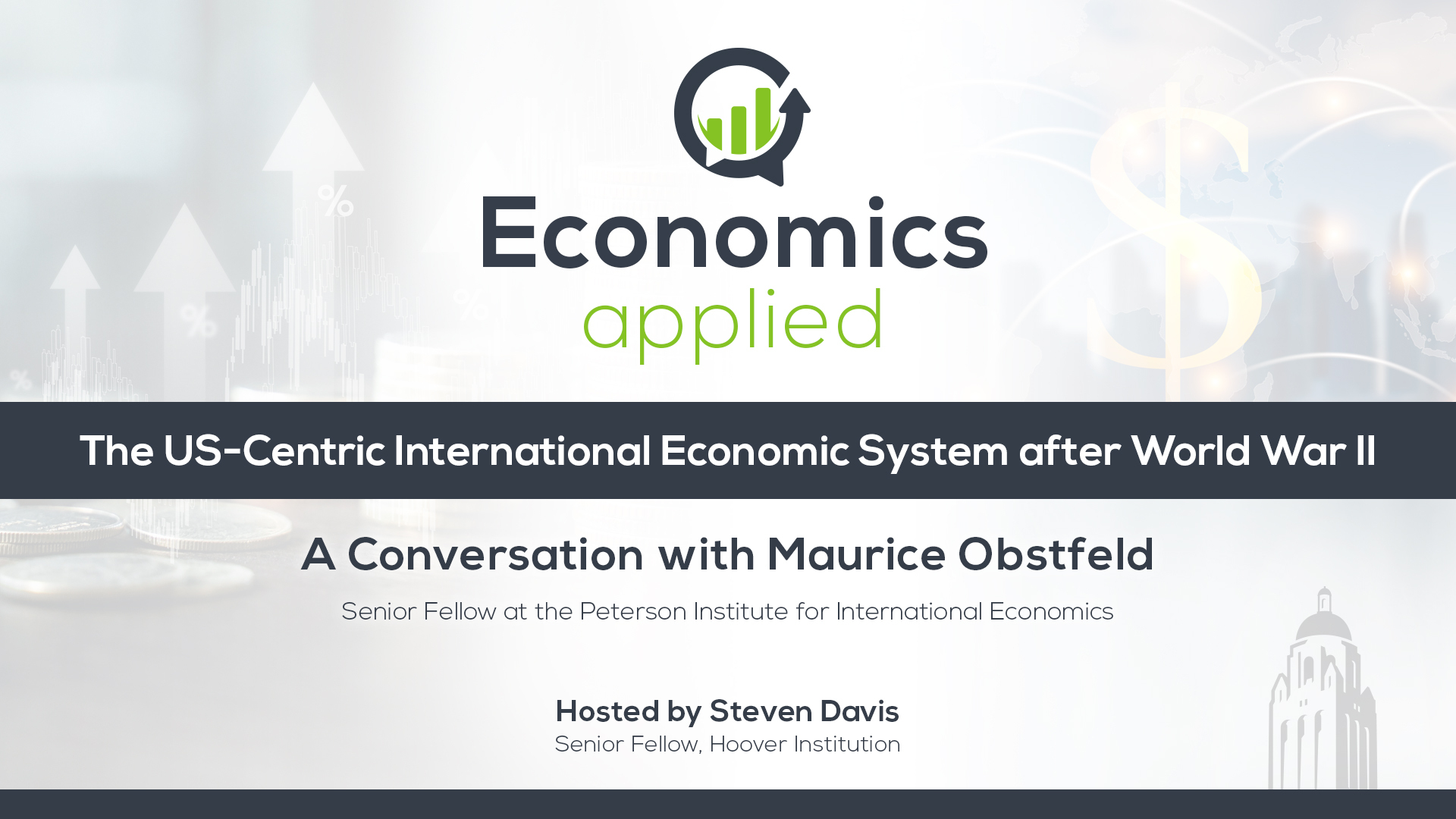- Economics
- Economic
- Trade
- Answering Challenges to Advanced Economies
Steve speaks to Maury Obstfeld about the international economic system that emerged after World War II, the central role of the United States, and how the positive-sum nature of the system fostered prosperity. They consider how the system functioned in the Bretton Woods era, the Nixon Shock of 1971, high inflation in the 1970s, transition to sound monetary policy in the 1980s, and how the U.S. Dollar became even more central to the system in the 1990s.
Recorded on July 15, 2025.
WATCH THE VIDEO
>> Steven Davis: Since the end Of World War II, the United States has played the leading role in designing, supporting and governing the international economic system. America's role in this regard was a form of enlightened self interest based on the foundational idea that international trade facilitates mutual prosperity. It was also based on a recognition that the United States, in concert with its allies, had the capacity to move the world from a zero sum international system to one that benefited all countries that chose to opt in.
Despite serious crises and many shortcomings, the system enjoyed a good deal of success in fostering prosperity. Real income per person in the United states is today 3.5 times its level in 1960 and 1.4 times its level in 2000. Similar numbers hold for the world as a whole. The Trump administration, however, sees the international system as unfair to the United States.
It claims that the system has hollowed out our manufacturing sector, undermined critical supply chains, allowed other countries to exploit the dollar and America's financial system, and brought overly costly security burdens to the United States. But before casting aside the old system, it's useful to understand what it was, how it functioned, and how it evolved.
It's also important to consider the costs and benefits of what might come next.
[MUSIC]
>> Steven Davis: Welcome to Economics Applied, sponsored by the Hoover Institution. I'm Steven Davis. My guest is Maurice Obstfeld. He's a Senior Fellow at the Peterson Institute for International Economics, Emeritus Professor of Economics at UC Berkeley, former Chief Economist at the International Monetary Fund, and one of the world's leading international economists.
Welcome, Maury, it's great to have the opportunity to chat with you.
>> Maurice Obstfeld: It's great to be here, Steve. Thank you.
>> Steven Davis: So you recently gave a speech, a lecture at the Bank for International Settlements, which, among other things, is a gathering place for central bankers from around the world.
And your speech is titled The International Monetary and Financial System A Fork in the Road. I've read the speech. I think it's a brilliant exposition, and so I wanted to talk to you about it today. Maybe we could start by if you could just define for us what you mean by an international monetary and financial system.
>> Maurice Obstfeld: Well, countries engage in international trade. They engage in international financial transactions. They typically have their own currencies. And so since trade and finance are mediated by currencies and credit, those exchanges have to be organized through markets, through institutions that bring a sort of order to the system.
So some refer to the current set of arrangements as a non-system, but I prefer to think of it as something we can analyze and think about in a somewhat orderly way. The speech that you referenced was the Andrew Crockett Memorial Lecture. And Andrew Crockett was a transformational head of the Bank of International Settlements between the mid-90s and the mid-2000s, a critical period in globalization.
And by the way, after he retired, he moved to the Bay Area and was part of the Economic Policy Working Group at Hoover. So he has a strong link to your institution.
>> Steven Davis: I did not know that. Thanks for bringing that up.
>> Maurice Obstfeld: Yeah, no, he was a remarkable man who passed away too early, unfortunately.
But in around 2009, he gave a speech at the first San Francisco Fed Asia Pacific Economic Policy Conference, where he sort of set out a very nice framework for thinking about international monetary and financial systems. And he basically had a threefold description in terms of the basic economic framework, the basic institutional structure, and the distribution of power in the system.
I think that's a very fruitful way to think about international monetary systems through history, going back to the gold standard and before and coming up to today. So that was the framework that I set out to begin the lecture.
>> Steven Davis: Okay, and am I right that the system that grew up after World War II was.
Was founded on this idea that international trade facilitates mutual prosperity? I think you agree with that statement. But is that right? And if so, how does it differ from what came before?
>> Maurice Obstfeld: Well, you're absolutely right, Steve. If you look at the articles of agreement of the International Monetary Fund, which was a pivotal institution set up after the war and that remains pivotal today, the goal of the fund, the overarching goal, is to promote international trade as a path to global prosperity.
Now, that's not a principle that I think many disagreed with even before as a intellectual proposition. But in practice, the interwar period, and particularly the 1930s, saw a complete collapse of trade as countries devolved into trade and currency warfare. And the design of a new international system, something that was purposefully undertaken at the Bretton Woods Conference in 1944, was meant to overcome those problems, to bring order to international financial and monetary relations.
And to facilitate the growth of world trade in a context where countries would also have the tools to avoid what was, of course, the other big problems of the Great Depression period, which were massive unemployment and deflation.
>> Steven Davis: Right, but weren't they also motivated by. I mean, I'm trying to put myself in the mindset of decision makers and political leaders at the end of World War II.
I mean, the first half of the 20th century saw two devastating world wars, which, at least in some extent, were motivated by a desire to acquire material goods, commodities, land and so on and so that. That was zero sum or negative sum interactions among nations. And how important was that in the thinking about trying to set up a system that would offer a path forward for countries that involved trade and cooperation rather than conflict and war?
>> Maurice Obstfeld: I think it was an all important consideration. Of course, the Great Depression proved a fertile breeding ground for authoritarian movements around the world. For a drive by those authoritarian nations, militaristic nations, to acquire resources and markets, captive markets, real property. And the design of the post war economic institutions took place within the broader context of the United Nations Organization, which had the broader goal of preventing territorial acquisition by conquest, for example, of guaranteeing certain human rights.
So it was very much front of mind of these post war planners that a, you know, a stable and prosperous international system was a necessary condition for the peaceful world which they all hoped to create after the end of the, you know, second devastating war of the 20th century.
>> Steven Davis: Right, okay. So the economic and security aspects were, were linked from the outset. And even though we being economists, often focus on the economic aspects of it, I think it's important to, remember that, that they've always been kind of joined together and seen as, when done right, reinforcing elements of a broader system designed to promote prosperity, security and peace.
>> Maurice Obstfeld: Yeah, I mean, part of the broader picture that I think is too often ignored is that the world of the interwar period was still largely a world of empires. Some of those empires were dismantled after World War I, but you still had British colonialism, French colonialism, Dutch colonialism, and the United States certainly was in favor of seeing those empires dismantled in certain ways.
Colonialism was not popular in the, in the United States, of course, you know, the British had a somewhat different view, but history was against them. So if you look at the two institutions set up at Bretton woods, of course there was the International Monetary Fund, but there was also the World bank, which had as its remote both reconstruction after the war and development, the idea that, you know, resources could flow to poorer countries and help them develop.
So part of the backdrop of the whole initial post war period is a process of decolonialization of countries and former empires, gaining the sovereignty and also having the desire to develop and the process of their integration into this international monetary and financial system. You had these countries gradually becoming independent, joining the International Monetary Fund, taking up independent positions on the world stage.
And it's not a story that we frequently in the rich economies think about much. But I think if you want to understand where we are now with an increasingly influential, assertive and prosperous Group of third nations, you know, countries that are standing outside of the broader conflicts among China, the EU and the US you have to, you have to think about that evolution as well.
>> Steven Davis: Okay, so I guess one, one thought prompted by that is another motivation for trying to design a market oriented opt in international economic system after the end of World War II is as to provide a productive substitute for the imperial regimes that had operated in much of the world before then where the imperial power basically designed and enforced the terms on which trade would take place.
So you reference this idea to capture markets and that was often done through imperial means. Where, where now the notion of cap capture markets has come to mean at least benign sense that you produce better products, offer better services than your, than your rivals domestically and abroad. And that's how you capture markets.
And that seems like a more productive, positive, some way to go about things.
>> Maurice Obstfeld: Yeah, I mean, I don't wanna paint the post war negotiations as completely high minded and selfless. You know, the US of course was going to be in the position of the leading military and industrial power and it certainly wanted to be able to export its goods to these rebuilding markets and to decolonizing markets throughout the world.
The British were clinging to a system of imperial tariff preferences which they were very loathe to give up. And the US as a counter position was embracing broad-based trade liberalization. There were problems of dependence of these colonial areas on sterling and the large balances they held in London which caused major transitional problems.
This was the stuff of negotiations between the us, the UK and other countries. The UK in the immediate post war period wanted to get a huge US loan to help them adjust from wartime to peacetime. And that was a means through which the US imposed a lot of pressure on the UK government.
So it was not all violins and roses. This was hard headed bargaining between great powers. But at the end of the day I think the US objectives were very much aligned with, you know, what became a more multilateral and open international system.
>> Steven Davis: That's right. And you know, part of this is what I had in mind by using the term enlightened self interest on the part of things.
I mean it was in the US self interest. It was partly a bet though, because at least tell me if you disagree. The system that arose after World War II was a different system than the world had seen before and in many respects a more beneficial and benign one.
I talked about the rise in real incomes in the United States and around most of the world in the decades after World War II. But it was also, at least, perhaps until very recently, the last few years, a period in which deaths by interstate military conflict were on a declining trend.
So on the security side, too, it was, again, there are many exceptions, but it was. Largely a success. At least I see it that way relative to what had come before in the first half of the 20th century and the 19th century and so on. Did you agree with that assessment?
>> Maurice Obstfeld: No, no, I definitely agree. I would sort of break down this post war period though, you know, in terms of the geopolitics into different sub periods.
>> Steven Davis: Yeah, well, let's do that. So the next thing I was going to ask you about. Tell us about the so called Bretton woods system that emerged in the early decades after World War II.
>> Maurice Obstfeld: Well, the Bretton woods system was centered in terms of its institutional structure on the imf, the World bank and of course the national governments that participated in those institutions and that in many ways had directed bilateral and multilateral relationships. The economic framework was one in which initially currencies were mostly inconvertible, which means you couldn't freely trade them in markets.
They were very much under the control of government intervention, in which private financial markets were barely functioning, in which trade barriers remained. And part of the goal of the IMF system was to gradually move to convertibility, at least for trade relationships, and thereby allow international trade to expand on a multilateral and non discriminatory basis.
The system also importantly was based on a assumption and rule which was in the articles of the fund, that exchange rates would be fixed but adjustable in extenuating circumstances. In other words, when an exchange rate adjustment might be needed to prevent persistent balance of payments deficits and unemployment.
In terms of the distribution of power, there is no question that the US was the unquestioned hegemon in the system. And it also had a unique institutional position because in effect, all the countries in the system pegged their currencies to the US Dollar in order to hold exchange rates fixed.
So if the French franc is pegged to the dollar and the German mark is pegged to the dollar, then the French franc and the German mark have no room to move against each other. The, the way this made the US Dollar singular and made the United States singular is if you think about it, this system with n currencies has N minus 1 exchange rates.
So if you have everyone but the US pegging their currencies to the dollar, then you've, you're fixing all the N exchange rates. So what is, what is, what does the US have to do? Well, in principle, nothing. In practice, the US had a commitment, which actually arose from US legislation of the 1930s, to convert official foreign exchange reserves of dollars into gold at a price of $35 an ounce.
So the US basically was making this commitment to underpin the system with a fixed price of gold for official transactions. In a sense, you could view this as a nominal anchor to the system. This was a US Obligation in practice, as long as countries were willing to accumulate dollars and view the dollar as a safe asset, there was no need to worry very much about this commitment.
And what it really translated into was more of a US Implicit promise to manage its economy responsibly. But it did give the US a tremendous latitude in monetary policy that other countries didn't have. If you were a small European country, you would have a difficult time moving your interest rate very far from the US Right.
Even though with limited capital movements you had some room to do this, but still, you know, implicitly flows of capital could take place through various trade transactions and you just have had less room for maneuver. So at some level, you can think of the US as being in the position of determining monetary, the monetary stance for the world economy.
And that's somewhat inaccurate, but not far from the actual truth of the period.
>> Steven Davis: Okay, so, yeah, it's good to be reminded of how differently foreign exchange markets, currency markets, operated in the early, early years after World War II than they do now, where there's just massive transactions volumes every day.
But you mentioned that, the Bretton woods system aimed to expand beneficial trade between countries. And I'm guessing that that led to increasing demand for dollars, dollar denominated securities, both for official foreign exchange reserves, but also to facilitate transactions and so on. And so I think this is part of, behind part of what you said.
So the US had some, was behaving in a way that gave other countries some assurance about the value of the dollar. But there were also forces in the economy, as I understand it, that were increasing the appetite to hold dollars outside the United States. And that I think ultimately led to some of the tensions that you've also.
That ultimately unwound the Bretton Wood system. Have I got that right? And if so, can you just explain that? So how did we get to the point where, you know, in the early years after World War II, where eventually the Bretton Woods system either became untenable or the United States chose not to undertake the kind of monetary and fiscal actions that would sustain it in the way that it operated?
>> Maurice Obstfeld: Well, it's hard. It's hard to summarize that succinctly. For context, the project of aiding recovery in Europe and Japan succeeded very well. It took a little bit of time, but it was sort of moved along by the U.S. investing resources and political capital in in those areas is something that did not happen after World War I.
Partially, it was motivated by the realization a couple of years after the war that the world was not headed to a. State of peaceful grace, but was headed to a cold war with the Soviet Union. And so you had the US Investing in its allies in Asia in promoting cooperation in Europe.
In point of fact, the, the origins of the EU come not from a desire to screw the United States, as President Trump has suggested, but from actually the US Trying to build a bulwark of democracy and prosperity on that front of the Cold War. This was a successful project.
And so Germany became a major exporter to the U.S. japan became a major exporter to the U.S. the U.S. balance of payments position weakened somewhat. And in the process of holding their currencies fixed, foreign countries intervened in the foreign exchange market, acquiring dollar reserves. They basically bought dollars to prop up its value.
And this happened all over the course of the period from basically the late 1950s through the end of the Bretton woods period. Now, there are sort of two basic problems going on here. One is that the growing industrial prowess of Japan, of Europe, raises certain adjustment problems in the US which are not totally unlike the, the ones we've discussed with regard to China and other emerging markets in recent years.
So you have labor market dislocations, you have a change in the U.S. external accounts, which raise concern among policymakers. You also have this sort of growing stock of dollars that foreign countries are holding. And now we come back to this idea that the US was obligated to convert these into gold.
>> Steven Davis: I just want to make, make it clear they other countries are holding dollars because it helps them manage their exchange rates, because it gives them some latitude with respect to mon domestically. Why are they holding, why do they want to hold all these dollars?
>> Maurice Obstfeld: Well, they're basically a side effect of capital, of balance of payments deficits from the US it's both changing trade relationships, but also capital outflows from the US into foreign currencies in foreign countries.
You have a rise of US Multinationals. They're starting to invest abroad. This is also weakening the US Balance of payments position in the form of these countries holding dollars. Now, whether whether that's a big problem or not depends on where you, where you sat in the analysis at the time.
A lot of the discussion in the history books, including my textbook with Paul Krugman and Mark Melitz, talks about what's called the Triffin problem. And we talk about it because it makes a great story that's easy to understand. And the story is this, that the US Held so much gold in Fort Knox.
I don't know if you remember the James Bond book and film Goldfinger.
>> Steven Davis: Yes.
>> Maurice Obstfeld: Yeah, so the Idea of this is that Goldfinger will detonate a nuclear bomb and make all the gold radioactive and bring down the international monetary system. But you know, gold, gold was very much on people's minds in the 1960s and the, the, the when the book came out.
And so there's so much gold. What happens when European currency reserves exceed that stock of gold at this price of $35 an ounce? Now, if they were all to cash in their dollars, the US wouldn't be able to obey this commitment. Triffin testified in front of Congress. He was a Yale professor, very distinguished, testifies at the end of the 1950s, writes a book, Gold and the Dollar Crisis.
And there's a huge amount of concern about this gold problem in the US balance of payments. And in a very early speech to Congress in February 1961, just after being inaugurated, President Kennedy says, we have this gold problem. We need to limit the financial support we provide to our allies because of course, this was part of the US balance of payments deficit, all of this security spending.
I'm raising this because this is a theme we can come back to about the present day.
>> Steven Davis: It's a theme that resonates with current complaints.
>> Maurice Obstfeld: But Kennedy proposed, which was kind of remarkable, that Congress changed the Federal Reserve act to allow reserves held by foreign central banks to pay higher rates of interest than what the private sector held.
And this way you could manage the gold problem independently of the rest of the economy. So this became a huge problem in people's minds. Now pushing back on this was Charles Kindleberger, famous MIT professor. He basically said, look, suppose you're a bank. You have short term liabilities, you have long term assets.
Of course you're vulnerable to Iran. This is the diamond dybvig problem, for which they rightly were recognized by the Nobel committee. But if the bank is well run, it's probably going to be fine. And the US is issuing liquid liabilities. It's investing abroad in long term FDI investments.
This is a normal thing for it to be doing. And let's stop getting all in a twist about gold because it's not really a problem. You had this tension going on in the system. My own view is that the gold thing was not itself a fatal flaw. Of course the US could have bought more gold.
The idea that what you have in Fort Knox is everything you have. This is a gold market, go buy gold. Most foreign central banks recognize that it would be not in their interest, not in the system's interest to convert dollars into gold. The major exception being the French their own agenda.
But this gold thing interacted with other fundamental problems in the US and those started arising in the in the mid-1960s with the stance of macroeconomic policy.
>> Steven Davis: Right, so one respect, I think, is an important respect in which the gold problem that the US faces. Faced and the world faced in the 1960s that distinguishes it from the traditional bank run model of diamond and Dybig is there are other, there are big players on the other side.
So you reference the French, and even though I think there was probably a widespread understanding at the time that it wasn't in the system or the global interest to upset the dollar based gold standard at that time, and large individual countries like France might have a different view.
And there were other countries that consciously played a cooperative, constructive role in maintaining the U.S. system. You talk about the, the Blessing Martin letter of 1967 in which I understand Germany basically said it was not going to seek to redeem its claims against the United States, its dollar based claims on the United States in the form of gold, even though technically they had the right to do that.
So there were big players. And in that sense that might be operating for reasons other than just concern about bank runs. In that sense, it's a little different than the diamond-Dybvig model.
>> Maurice Obstfeld: Yeah, it's different. And you know, there's also no lender of last resort in gold, but big players can help you or hurt you.
>> Steven Davis: Yes, right, right.
>> Maurice Obstfeld: Depending on how they, they coordinate among themselves. And the French were definitely not a cooperative player in this game. But, but, but not, you know, the other biggest players were not really going along with this. But it was not always entirely high minded concern for the system.
For example, the Blessing letter was negotiated under a credible threat that the US might reduce its troop commitments in Germany.
>> Steven Davis: Well, that was part of the system.
>> Maurice Obstfeld: Right, and that was part of the system, and there's a fascinating connection between the role of the dollar in the system and the security commitments that the US provides, which again is a topic of current conversation.
>> Steven Davis: Right, okay. But anyway, by the late early 1970s, late 1960s, we'd reached a situation where, correct me if I'm wrong, other governments had dollar claims against the United US dollar denominated obligations that if they were to all want to redeem them, greatly exceeded the gold reserves in the United States.
>> Maurice Obstfeld: And that actually was the case by the early 1960s.
>> Steven Davis: It was already the case by the early 1960s, okay. But I guess it, it was more so by the late 90s. Absolutely. Early 1970s.
>> Maurice Obstfeld: Absolutely.
>> Steven Davis: But then what brought it to a head? Why, and we're getting into the Nixon shock of 1971.
And but what brought it to a head?
>> Maurice Obstfeld: Well, go back to the mid-60s and Lyndon Johnson, Great Society, Vietnam War, general reluctance to choose between guns, guns and butterfly. Famous instance of Johnson inviting William McChesney Martin, the chair of the Fed, down to the LBJ rants and browbeating him to keep interest rates low.
Again, as I say these things I think about today's headlines, but maybe come back to that. And basically the US economy became overheated. There was a belated attempt to slow down the overheating. The US economy slowed. And you have Nixon inheriting this basically, but being in a situation by around 1970, 71 where he's starting to think about re election, he's seeing an economy with tepid employment, with excessively high inflation, continuing balance of payments problems and in fact, let me just focus in a little bit on the balance of payments issue and the reserves issue because I think that's part of what sort of forced Nixon's hand in August of 1971.
In 1967, the British devalued sterling. This was sort of a major shock to the system. And in the 60s after that you had the riots in France, you had devaluation of the French franchise, you had much more currency instability. And eventually that instability moved to the dollar because markets realized that a devaluation of the dollar was what was needed to both solve the balance of payments problem of the US and also to improve employment prospects in the, in the US So you start seeing speculation, speculative flows into European currencies, particularly Deutsche Mark, Swiss Franc, Dutch Gilder.
Now think about, think about how these work. You know, markets decide they, they want to hold large amounts of Deutsche marks, so they go to the foreign exchange market, sell, sell a lot of dollars. The German central bank, the Bundesbank has dollars and its reserves rise. And this is much bigger than just the drip, drip, drip of trade flows because this is very discreet portfolio shifts such as we're now more used to.
But this put the growth of dollar reserves into hyperdrive. And again, this is an important point, that the growth in foreign currency dollar reserves is not limited by US trade balance deficit. It's all about capital flows. And those can cause those reserves to spike up. And that's exactly what they did that caused inflationary pressures abroad because of money supply increases.
Again, this idea that these countries had really limited control over their monetary policies. And with all these dollars flowing into the market and them forcing to monetize them in the form of Marx or Gilders or Swiss francs, they were losing monetary control. So the tensions on the system grew enormously.
So the Europeans were extremely unhappy. Nixon was unhappy because he had inflation in the US and within this system, he didn't really have a way to devalue the dollar because, remember, all these other currencies were doing the pegging. He could have changed the dollar's value in terms of gold, but then they could have also changed their currencies.
Values in terms of gold. So ultimately what he decided to do in August of 1971 was to abrogate this commitment of the US to turn dollars into gold. So he closed the gold window. He imposed a broad wage and price freeze on the US Basically a brute force way of stopping inflation.
Just telling people, well, you can't raise prices, so we have no inflation. And he levied a 10% surcharge on all dutiable foreign imports and basically said to trade partners, we're going to keep this in place until you agree to revalue your currencies against the dollar. So we set in train a series of negotiations.
>> Steven Davis: Okay.
>> Maurice Obstfeld: That ultimately resulted in the revaluation he wanted.
>> Steven Davis: Right, just to make sure I've got it right, there was in principle another approach which would have been to reduce the need to devalue the dollar. But that would have involved a more restrictive fiscal policy, higher taxes or lower spending, and a more restrictive monetary policy.
And that was politically untenable, I guess, for Johnson and Nixon. Yeah, I mean, for Nixon it was totally untenable to basically restrict macro policy sufficiently to bring down the US price level.
>> Maurice Obstfeld: Right. And you know, in, in fairness to Nixon, that is precisely what the Bretton woods system was, was set up to avoid.
That's why it had this devaluation clause in the articles of agreement of the fund. But the US didn't have that.
>> Steven Davis: Exactly.
>> Maurice Obstfeld: I understand.
>> Steven Davis: Okay. But I mentioned it because it was just kind of subtly woven into your comments and I wanted to draw it out explicitly.
But also it's another thing about the past that resonates with the present day. We're on what looks to be an unsustainable fiscal trajectory and there's not much political will to resolve, at least that I can see. And that's going to build up inflationary pressures over time or pressures to take other steps like the wage and price controls in the Nixon era, or various forms of financial repression as ways to try to deal with the strains presented by the fiscal path.
So it's not exactly the same as was back in the 60s and early 70s, but there are some similar themes at work there.
>> Maurice Obstfeld: Yeah, definitely. Policy is never easy and there are always trade offs. While we're on the subject, though, just an interesting footnote, there wasn't a different approach suggested for policy in the early 1970s.
In 1971, Robert Mundell, who taught at Chicago, Waterloo, Columbia, won the Nobel Prize. In 1999 wrote an essay called the Dollar in the Policy Mix 1971. His suggestion for US policy was very tight monetary policy to, to offset the gold losses and an expansionary fiscal policy to offset the negative effects on employment.
But a key point of his fiscal policy recommendation was that it wasn't entirely Keynesian type aggregate demand stimulus. It was actually supply side structural reforms that might increase efficiency, make the economy more competitive and spur growth. That's actually the origin of supply side economics. This is the first sort of exposition of that idea.
>> Steven Davis: Yep, okay, thanks for that. That's a good point. So I want to bring us closer to the present day. So I'm going to summarize what I understand briefly and if I get things wrong. So after, you know, after the Nixon shock of 71, the US moved to floating exchange rates in 73, considerable liberalization of the capital counts I guess in 74.
And we, there was then an integration of dollar based onshore and offshore dollar markets for lending and so on. So we moved to something which in some respects looks closer to the present system. We had a big inflation that played out in the 70s that what was partly a consequence of these pent up economic and fiscal pressures we discussed earlier.
70s very turbulent decade. Let's not spend too much time on it, but [LAUGH]. So we can get back, so we can get closer to the President. But then in the 1980s, in late 79, I guess Paul Volcker becomes Fed Chair. There's a major reversal in US monetary policy.
It's a very painful experience in the early 1980s in the United States. Major two recessions, one quite deep. But eventually we got to a position where credibility in US monetary policy was restored. Inflation rates and nominal interest rates came down to low levels. And surprisingly enough by the 1990s the dollar had had.
It never disappeared, but it become even more central or as, as central to the international monetary and financial system as it had been in the Bretton woods era. So is that, is that a fair quick summary? I hope I didn't do great violence to the, [LAUGH] 70s and 80s.
>> Maurice Obstfeld: No, not, not at all. I would say that the dollar in many ways is more central today. The seventies took a big chunk out of its international role and global confidence. In fact, it isn't really until the late 1980s that the US dollar starts recovering as its position in international reserves.
If you look at the late 1980s, it's down in the 40s, but by the 90s and certainly the late 90s, the dollar is reigning supreme. And all of that is being reinforced by the end of the Cold War.
>> Steven Davis: Right. And so, we haven't talked explicitly a lot about trade, but in the last few minutes.
But, we started out with the GATT, General Agreement of Tariffs and Trade. I don't remember exactly if I've got the got the term right. The GATT expanded over time, it evolved into the WTO. So this was also unfolding over the decades after World War II and then eventually, China became a part of the WTO.
So this is all part of the expanding international economic system. So the vision that trade would promote prosperity globally was, with some hiccups, being played out over the course of many decades. So, again, I'm summarizing very briefly, trying to bring us really up to the 21st century.
[MUSIC]
ABOUT THE SPEAKERS
Maurice Obstfeld is a Senior Fellow at the Peterson Institute for International Economics, Emeritus Professor of Economics at UC-Berkeley, former Chief Economist at the International Monetary Fund, and one of the world’s leading international economists.
Steven Davis is the Thomas W. and Susan B. Ford Senior Fellow and Director of Research at the Hoover Institution and Senior Fellow at the Stanford Institute for Economic Policy Research (SIEPR). He is a research associate of the NBER, IZA research fellow, elected fellow of the Society of Labor Economists, and a consultant to the Federal Reserve Bank of Atlanta. He co-founded the Economic Policy Uncertainty project, the U.S. Survey of Working Arrangements and Attitudes, the Global Survey of Working Arrangements, the Survey of Business Uncertainty, and the Stock Market Jumps project. He also co-organizes the Asian Monetary Policy Forum, held annually in Singapore. Before joining Hoover, Davis was on the faculty at the University of Chicago Booth School of Business, serving as both distinguished service professor and deputy dean of the faculty.
RELATED SOURCES
- “The International Monetary and Financial System: A Fork in the Road,” Andrew Crockett Memorial Lecture delivered by Maurice Obstfeld in Basel, Switzerland, 29 June 2025.
FOLLOW THE GUEST
- Maurice Obstfeld’s personal website
- Commentary by Maurice Obstfeld
ABOUT THE SERIES
Each episode of Economics, Applied, a video podcast series, features senior fellow Steven Davis in conversation with leaders and researchers about economic developments and their ramifications. The goal is to bring evidence and economic reasoning to the table, drawing lessons for individuals, organizations, and society. The podcast also aims to showcase the value of individual initiative, markets, the rule of law, and sound policy in fostering prosperity and security.
For more information, visit hoover.org/podcasts/economics-applied.



















